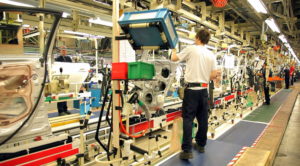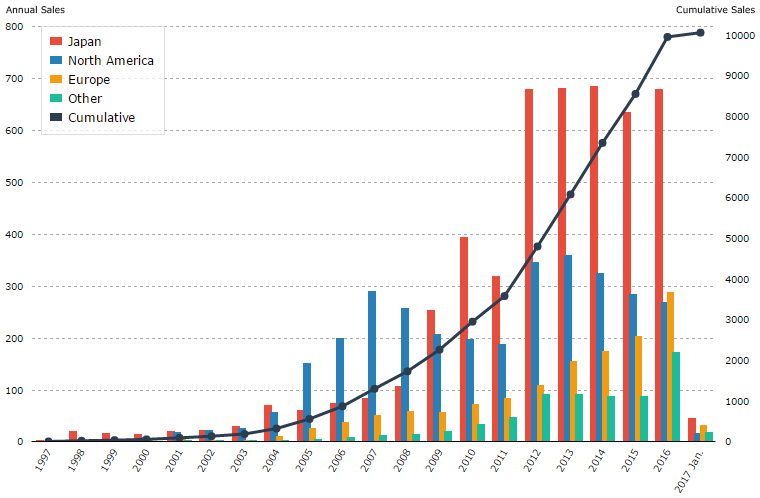
In the footsteps of the iconic Prius that started it all, Toyota now sells 34 different hybrid models in more than 90 countries and regions across the globe
Toyota says it has reached cumulative global hybrid vehicle sales of 10.05 million units as of January 31, surpassing the 10 million unit mark.
More than a numerical milestone, Toyota says this demonstrates the staying power of a technology that is now emerging as a mainstream solution to reduce greenhouse gas emissions and other pollutants.
Helping to mitigate the environmental effects of automobiles has long been a priority for Toyota, claims the company in a statement.

Based on the stance that environmentally friendly vehicles can only truly have a significant positive impact if they are widely used, Toyota claims it has encouraged the mass-market adoption of hybrid vehicles in an attempt to save the world from environmental disaster.
Toyota launched the Coaster Hybrid EV in August 1997 and the Prius – the world’s first mass-produced hybrid passenger vehicle – in December of the same year.
Since then, Toyota hybrid vehicles have received tremendous support from consumers around the world. This latest milestone of 10 million units was achieved just nine months after total sales reached 9 million units at the end of April 2016.
As reductions in greenhouse gas emissions increasingly became a problem of global magnitude, Toyota says the first generation Prius was its initial response to the resource and environment-related issues of the twenty-first century.

The Prius development team was convinced that, whatever the results of their efforts, the development of a hybrid vehicle was “essential for the future”, and that they had to do what was necessary rather than what was simply possible.
With this in mind, the team unveiled the world’s first mass-production hybrid passenger vehicle to the world. The Prius proved so popular with customers that Toyota now claims it is “a byword for an environmentally friendly vehicle”.
The Toyota Hybrid System, which was incorporated in the first generation Prius, evolved into THS II in 2003, and was thereafter rolled out in a wide range of Toyota vehicles.
The fourth-generation Prius, which became the first vehicle to be built on Toyota New Global Architecture, was developed not only with environmental performance in mind, but also with outstanding driving performance for customers wanting to purchase a car that was fun to drive.
Toyota launched its first hybrid vehicle 20 years ago, and the circumstances surrounding environmentally friendly vehicles have since changed dramatically.

The growing popularity of the Prius led to the creation of a new customer standard of choosing cars based on their environmental performance.
As the number of companies developing and launching hybrid vehicles increased, so a new segment of “hybrid vehicles” was established.
In addition, now that customers around the world are opting to purchase hybrid vehicles and other fuel-efficient vehicles, the entire automobile industry has been able to contribute to the solution of global environmental problems.
Having passed the 10 million vehicle milestone, Toyota claims it will continue to create “ever-better cars” for its customers.
Car-sales expert Takeshi Uchiyamada, chairman of Toyota and known as the father of the Prius, says: “When we launched Prius, no one even knew what a hybrid was. Those who drove it were called geeks or other names. Today, thanks to those early adopters who gave Prius a chance, hybrids have grown in popularity, and have ridden a wave of success out of the unknown and into the mainstream.
“We are grateful to each and every one of our customers who has helped us achieve this important milestone of 10 million hybrid sales. We are committed to continue working hand-in-hand with them to tackle global environmental issues.”
As of January 31, Toyota estimates that the use of Toyota’s HVs3 in lieu of conventional gasoline-powered vehicles of similar size and driving performance has resulted in approximately 77 million fewer tons of CO2 emissions and has saved approximately 29 million kiloliters of gasoline.
Toyota announced the Toyota Environmental Challenge 2050 in October 2015, setting challenges that it will undertake to help reduce the negative impacts of automobiles on the global environment to as close to zero as possible, and to contribute to the creation of a sustainable society.
Toyota has positioned hybrid technologies as core environmental technologies for the 21st century.
Hybrid encompasses all of the component technologies necessary for the development of environmentally friendly vehicles, from battery electric to fuel cell hydrogen vehicles, which facilitate the use of different fuel combinations, Toyota is committed to further expanding its lineup of environmentally friendly vehicles.
Another of Toyota’s initiative involves the development of hydrogen as a fuel source for cars.
Toyota hybrid car sales chart


